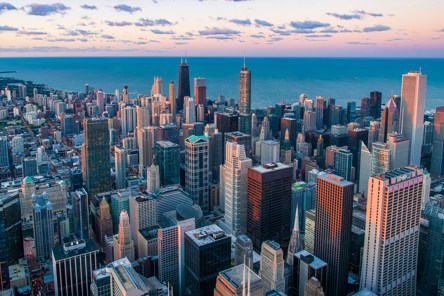Tomorrow's cities will look a little different. As populations in urban centers skyrocket, the need for smarter, greener logistics solutions will rise. What might this look like? With the right urban logistics strategies in place—powered by smart city infrastructure—expect faster deliveries, lower carbon footprints, cleaner air, and reduced traffic congestion. Together, these benefits improve the quality of life for city residents.
In this article, we'll explore urban logistics solutions and how smart city technology can—and will—redefine the supply chain. Let's get started.
What Is Urban Logistics, and Why Is It Important?
Urban logistics aims to move goods as efficiently as possible in densely populated urban areas like city centers. Best practices ensure optimal delivery speed with minimal impact on congestion. There's also an environmental element, with sustainable, low-to-zero-emission transportation strategies prioritized over alternatives reliant on non-renewable and polluting energy sources.
Unlike traditional logistics, urban logistics is not about large-scale transport networks. It focuses on the intricacies of last-mile delivery—the final step in the supply chain, which is often the most complex and resource-intensive.
For example, think of highway freight, where goods are moved in bulk. Now, consider city freight. Individual packages must find their way to their destination through crowded streets, congested roads, and limited curb space. Urban logistics seeks to simplify these complexities, and it uses technology and innovative strategies to meet urban supply chain efficiency goals. With growing urban populations and the rise of eCommerce, getting urban logistics right is critical to shaping livable, sustainable cities.
Smart Cities and Urban Logistics Solutions
Smart cities are urban environments where technologies like the Internet of Things (IoT), artificial intelligence (AI), and data analytics are integrated to improve the quality of life. This includes optimizing resource usage and urban logistics.
Smart cities use real-time data to create systems that reduce inefficiencies and support sustainable urban freight—two goals we have here at SEKO Logistics. We also leverage logistics innovations in cities, like AI-powered logistics optimization and IoT-enabled tracking, to shape practical solutions to urban challenges, such as congestion and limited delivery windows. Our clients are empowered to meet consumer expectations for faster, more sustainable deliveries.
Benefits of Smart City Logistics
There are many exciting benefits of smart city logistics, and looking ahead, we expect to see the aforementioned technologies woven into every stage of the logistics process.
Key advantages include the following:
-
Faster delivery speed. Data-driven urban logistics use real-time analytics to plan optimal delivery routes, anticipate roadblocks, and proactively prevent delays.
-
Lower-cost delivery solutions. Smart transportation technologies lower operational expenses through route optimization and energy-efficient vehicles.
-
Minimized environmental impact. Cities can cut emissions and promote cleaner air with sustainable city logistics systems.
-
Higher quality of life in urban areas. Reduced congestion and efficient freight systems contribute to a better quality of life for city residents.
Urban Logistics and Sustainability
Consumers, investors, and regulators are all increasingly concerned about sustainability. The good news? Leading approaches to urban logistics leverage green energy solutions to deliver cleaner, greener solutions. This includes electric vehicles (EVs), which reduce reliance on fossil fuels and lower greenhouse gas emissions. Solar-powered charging stations, an example of smart infrastructure for logistics, further enhance sustainability.
In addition, urban logistics innovations like AI-powered logistics optimization work to lower environmental footprints. Here's how:
-
AI calculates the best route to lower fuel consumption and emissions.
-
Green technology like EVs, e-bikes, and drones make last-mile strategies less polluting.
-
Smart curbside management ensures delivery zones are optimized to prevent pedestrian traffic bottlenecks.
Technology Powering Smart City Transportation Systems
Sustainable urban logistics requires new and innovative technologies to reach its full potential. Some examples include:
-
Tracking enabled by IoT devices. This provides visibility into goods' locations so providers can make quick adjustments as issues arise. Deliveries are more likely to show up on time, which contributes to a superior customer experience.
-
AI-powered optimization. AI technology can analyze huge swaths of data to build efficient delivery routes, schedule freight at optimal times, and even predict demand patterns and prepare accordingly.
-
Smart traffic management systems. These evaluate traffic flow and adjust signals accordingly. This helps to minimize congestion and, in high-demand periods, gives freight the right of way.
The Future of Urban Logistics Today
Urban logistics in smart cities might sound like a thing of the future. But in reality, these technologies are already here.
At SEKO, we are on the cutting edge of logistics, and our network leverages the latest in smart city infrastructure to deliver a truly future-proof service. As an early adopter of real-time data analytics and cutting-edge delivery technologies, we improve urban supply chain efficiency and last-mile strategies with:
-
AI and predictive analytics that streamline delivery processes and reduce the risk of delays
-
Smart infrastructure integration like IoT sensors and cloud-based platforms that lock in coordination across the entire supply chain
Urban logistics has the power to redefine city living. We are on a mission to make deliveries faster, greener, and more reliable—all with the help of technology.
Realizing the Smart City Vision
The sustainable, connected cities of the future are only possible with smart urban logistics strategies. This demands an investment in green energy, AI, and IoT, as well as collaborative public-private partnerships. Together, we can address major challenges like congestion and emissions with intelligent urban mobility solutions that pave the way for the sustainable urban environments of the future.
If you are ready to embrace the next generation of urban logistics, get in touch today! Our team can help you reach your sustainability goals and delight your customers in the process.





